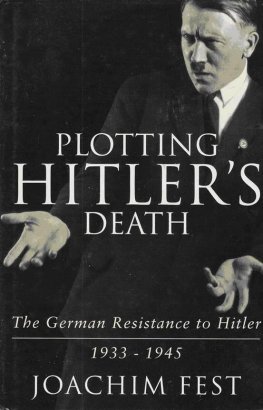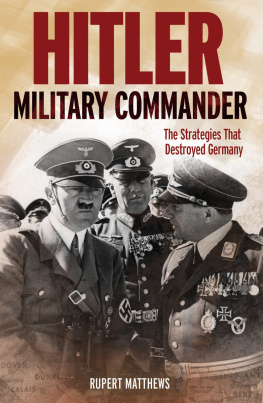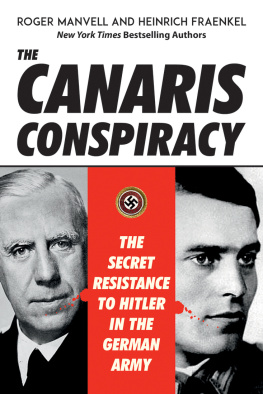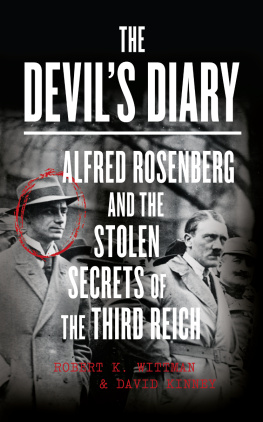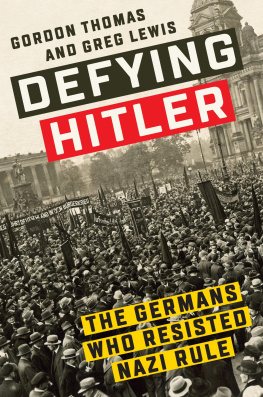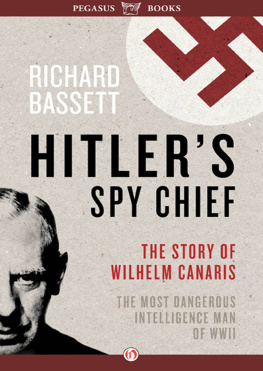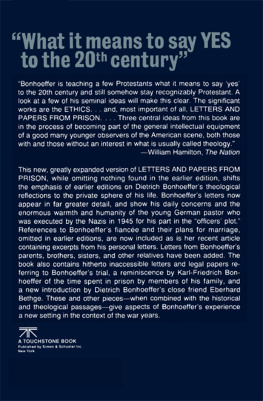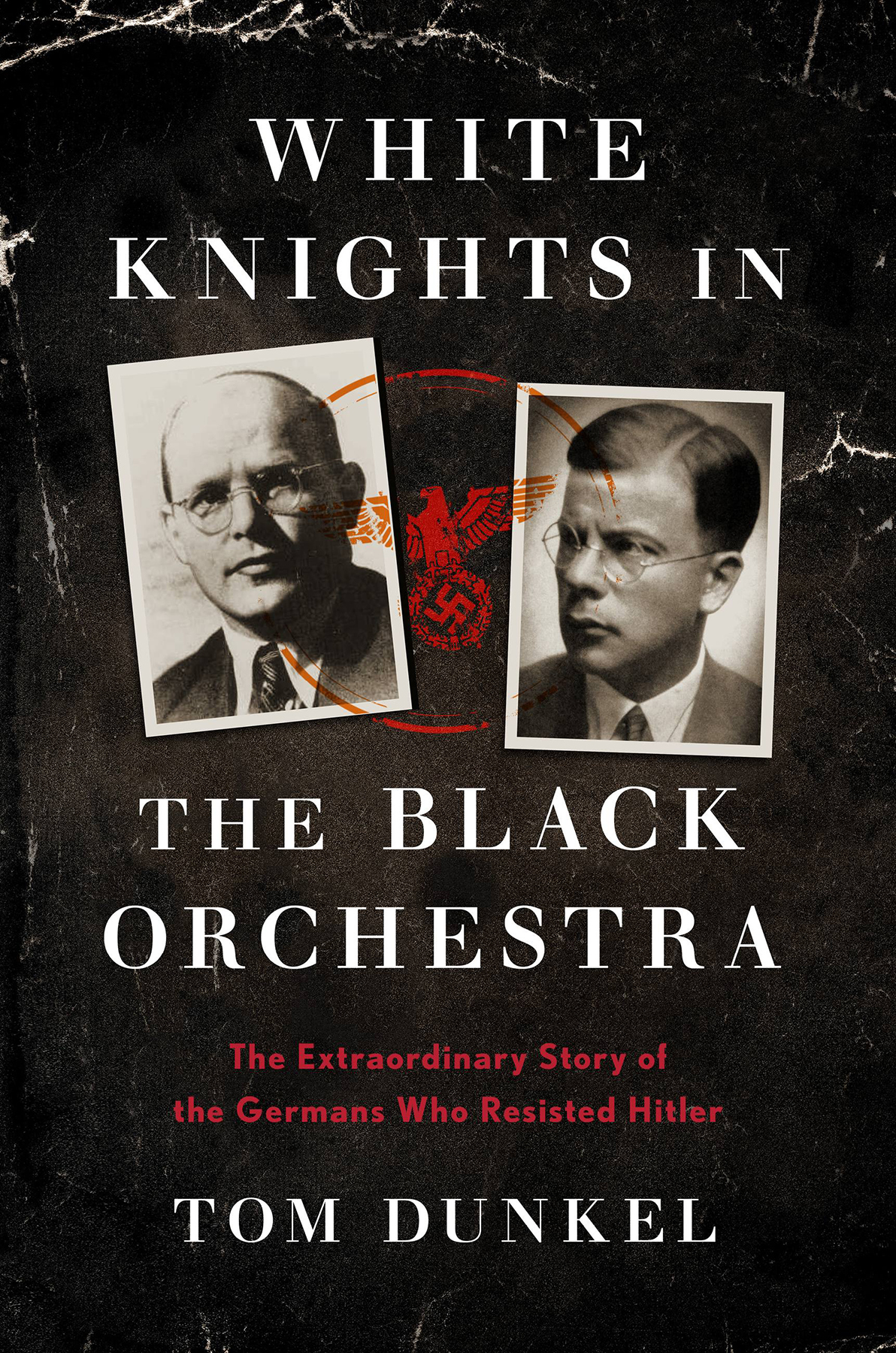
Copyright 2022 by Tom Dunkel
Cover design by Alex Camlin
Cover images: Dietrich Bonhoeffer Sueddeutsche Zeitung Photo / Alamy Stock Photo; Hans Dohnanyi INTERFOTO / Alamy Stock Photo; Old paper texture MagicDogWorkshop / Shutterstock
Cover copyright 2022 by Hachette Book Group, Inc.
White Knights in the Black Orchestra has been made possible in part by a major grant from the National Endowment for the Humanities: Democracy demands wisdom. Any views, findings, conclusions, or recommendations expressed in this book do not necessarily reflect those of the National Endowment for the Humanities.
Hachette Book Group supports the right to free expression and the value of copyright. The purpose of copyright is to encourage writers and artists to produce the creative works that enrich our culture.
The scanning, uploading, and distribution of this book without permission is a theft of the authors intellectual property. If you would like permission to use material from the book (other than for review purposes), please contact permissions@hbgusa.com. Thank you for your support of the authors rights.
Hachette Books
Hachette Book Group
1290 Avenue of the Americas
New York, NY 10104
HachetteBooks.com
Twitter.com/HachetteBooks
Instagram.com/HachetteBooks
First Edition: October 2022
Published by Hachette Books, an imprint of Perseus Books, LLC, a subsidiary of Hachette Book Group, Inc. The Hachette Books name and logo is a trademark of the Hachette Book Group.
The Hachette Speakers Bureau provides a wide range of authors for speaking events.
To find out more, go to www.hachettespeakersbureau.com or call (866) 376-6591.
The publisher is not responsible for websites (or their content) that are not owned by the publisher.
Library of Congress Cataloging-in-Publication Data
Names: Dunkel, Tom, author.
Title: White knights in the Black Orchestra : the extraordinary story of the Germans who resisted Hitler / Tom Dunkel.
Description: First edition. | New York: Hachette Books, 2022. | Includes bibliographical references and index.
Identifiers: LCCN 2022019108 | ISBN 9780306922183 (hardcover) | ISBN 9780306922176 (ebook)
Subjects: LCSH: Anti-Nazi movementGermany. | Government, Resistance toGermanyHistory20th century. | DissentersGermanyHistory20th century. | GermanyHistory1933-1945.
Classification: LCC DD256.3 .D826 2022 | DDC 943.086dc23/eng/20220518
LC record available at https://lccn.loc.gov/2022019108
ISBNs: 978-0-306-92218-3 (hardcover); 978-0-306-92217-6 (ebook)
E3-20220927-JV-PC-COR
For brother Bill: my oldest friend and favorite history nerd.
And for our Dad who, like millions of Americans, was called upon to fight the Good War.
Nobody made a greater mistake than he who did nothing because he could only do a little
Edmund Burke, eighteenth-century Irish author and politician
T HE HEAD PASTOR of Abyssinian Baptist Church in New York City declared war on the Great Depression one Sunday morning in December 1930. More than a quarter of the people in this predominantly black Harlem neighborhood were unemployed, and it sickened him to see such despair. Adam Clayton Powell Sr. was six-foot-three and still cut an imposing figure at age sixty-five and still delivered stem-winder sermons. This one took a half hour to roll off his tongue, enthralling an overflow crowd that spilled from the sanctuary into a basement community room.
The axe is laid at the root of the tree, Powell thundered, paraphrasing the gospel of Luke, and this unemployed mass of black men, led by a hungry God, will come to the Negro churches looking for fruit! And finding none, will say Cut it down and cast it into the fire!
Abyssinian was about to open a soup kitchen and launch its own relief fund for those struggling without jobs. The reverend announced he himself would donate four months salary in order to set a righteous example. His flock responded with unexpected gusto. Unbidden, many of them got up and walked to the front of the church, digging deep into their pockets and filling the collection plates. One woman handed over her pocketbook containing a weeks pay. All told, the deacons counted $1,500 in cash and pledges. With characteristic immodesty, Powell pronounced it the most impressive climax to a sermon I had ever witnessed.
That also was unlike anything Dietrich Bonhoeffer had ever seen. And hed come a long way to be part of it.
Bonhoeffer was a German theologian on a fast track, having earned his bachelors, masters, and doctoral degrees by the time he was twenty-one. He then briefly worked as an assistant pastor at a Lutheran church in Barcelona. Now twenty-four years old and fresh from finishing a postdoctoral degree in systematic theology at the University of Berlin, he wasnt old enough yet to be ordained in Germany. While biding his time, he accepted a two-semester fellowship at New Yorks Union Theological Seminary, a cradle of progressive Christian scholarship. In September Bonhoeffer had sailed west to America on a ship named Columbus.
U NION T HEOLOGICAL S EMINARY abutted the campus of Columbia University, two miles and several income-tax brackets from Abyssinian Baptist Church. Rather than attend nearby Riverside Churcha soaring, neo-Gothic replica of Frances Chartres Cathedral paid for in part by money-bags parishioner John D. RockefellerBonhoeffer chose to hike over to West 138th Street. To Abyssinian Baptist. Franklin Fisher, a black Union Theological seminarian from Alabama, suggested he come take a look.
Powell didnt find religion until his late twenties. As a boy Bonhoeffer already knew he wanted to be a minister. At fifteen he was studying Hebrew, Greek, Latin, and French. His siblings teased him about his career choice, saying organized religion was dull and antiquated. Dietrich replied, In that case I shall reform it. He wasnt joking.
He and his twin sister Sabine were the sixth and seventh youngest in a line of eight children raised by affluent, well-connected parents who made a point of not frequenting church. Karl Bonhoeffer was chairman of the Department of Psychiatry and Neurology at Charit Hospital, the largest teaching hospital in Berlin, a traditionalist who wanted nothing to do with Sigmund Freud and his psychoanalytic bunkum. Paula Bonhoeffer, a college graduate, homeschooled all her children for their first few formative
The Bonhoeffers lived in a stately single-family home in Grunewald, a leafy Berlin enclave popular with movie stars and business executives. They also had a getaway retreat in the Harz Mountains. Their children had rules to obey (study hard, let adults do most of the talking at the dinner table, no dead-fish handshakes allowed) and were thoroughly marinated in art, music, and culture, plus fussed over by cooks, nannies, and housekeepers. In high school Dietrich confided to Sabine, I should like to lead an unsheltered life once, which might explain why years later he bypassed upscale Riverside Church in favor of gritty Abyssinian Baptist.
With his German accent, corn-silk hair, Old World refinements, and natural reserve (a friend dryly noted that Dietrich was not the type to put all his wares in the shop window), Bonhoeffer seemed destined to feel hopelessly out of place in Harlem. Not so. He embraced it body and soul, devouring books by W. E. B. Du Bois and poems by Langston Hughes. A classically trained pianist whod been playing Mozart sonatas since childhood, Bonhoeffer cut loose musically, hanging out in smoky jazz joints and occasionally at classier venues like the Cotton Club or Top Hat. He fancied Negro spirituals too. Paul Robesons gospel baritone boomed from the record player in his dormitory. Go down Moses! Way down in Egypt land. Tell old Pharaoh, Let my people go!


